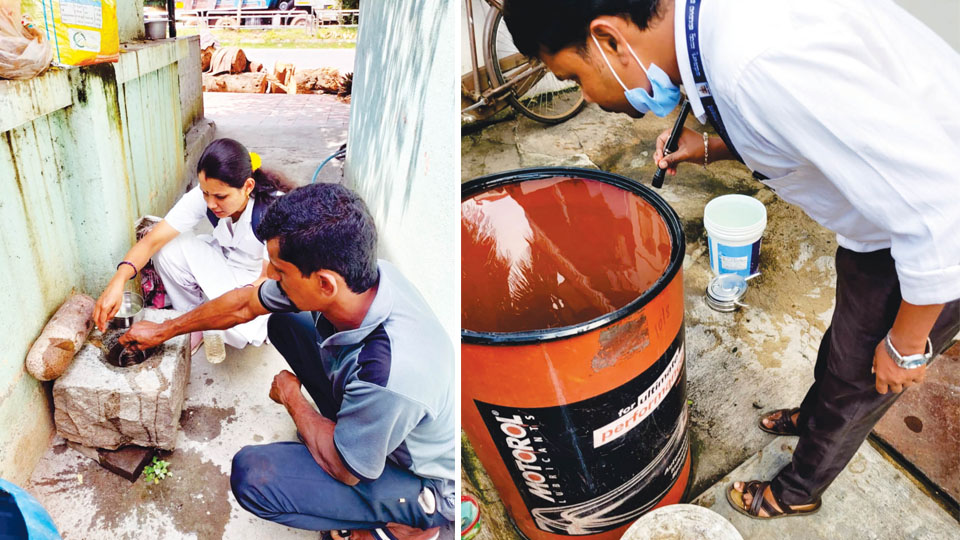Health Department conducts house-to-house awareness on disease prevention
Mysore/Mysuru: While COVID-19 cases have shown a steep decline, there has been a considerable increase in dengue cases in Mysuru. Heavy rainfall and cold climate have contributed to the spike in cases.
The Health Department has asked the people to be wary of a possible dengue outbreak, especially in semi-urban areas. From January 2022 till Oct. 18, 638 dengue cases have been reported in Mysuru and as the rains have continued, there is a concern that the disease might spread further.
Blood samples of 3,829 suspected cases have been tested from January 2022 till Oct. 18 and 638 have tested positive. While 39 cases have been reported in January, 28 in February, 29 in March, 30 in April, 55 in May, 115 in June, 149 in July (the highest), 91 in August, 78 in September and 24 cases have been detected till Oct. 18. Rains support the widespread proliferation of the Aedes aegypti mosquito which is a vector for dengue. Continuous rains, cold breeze and cloudy weather increase the mosquito population and mainly rain water remaining stagnant is playing a perfect host for dengue spreading mosquitoes to breed. Mosquitoes will decrease only if the sun shines bright.
2017 data
In 2017, 843 dengue cases were reported in Mysuru and except for that year, the cases have shown a decline in the nine years, said health officials. Eradication of the breeding of Aedes aegypti mosquitoes is a part of the campaign and it actively involves communities in dengue eradication, they added.
Studies have shown that the most common serotype is DENV-2 that can cause difficulties in people with comorbidities. Dengue fever transmission is seasonal, with increasing activity during the monsoon season (June to August) and the highest number of cases have been documented in July.
Decline in cases
According to District Vector-Borne Diseases Control and Food Control Officer Dr. Chidambara, when compared to the data of the last three months, there has been a decline in dengue cases in October. “There is no need to panic as the outbreak is under control and once it is controlled, the cases will automatically decline,” he said.
Routine surveillance and source reduction activities have been intensified and health teams comprising staff from Primary Health Centres and ASHA workers are visiting individual houses to spread awareness on keeping the disease at bay by taking all precautions including prevention of water stagnation, said District Health Officer (DHO) Dr. K.H. Prasad.
The DHO clarified that the recent girl’s death at Tilaknagar cannot be primarily attributed to dengue. “Reports also said that the victim had typhoid. An ELISA Blood Test could accurately determine if the child had dengue but the test was not done in this case,” Dr. Prasad clarified.
Dengue fever is a mosquito-borne tropical disease caused by one of the five major serotypes (or strains) of the dengue virus. Symptoms of the fever typically set in anywhere from three days to two weeks of being exposed to the virus. The most common symptoms are fever and joint pain while headaches, muscle pain and general fatigue can also be seen. Patients must seek immediate medical attention if fever does not subside even after three days.








Recent Comments